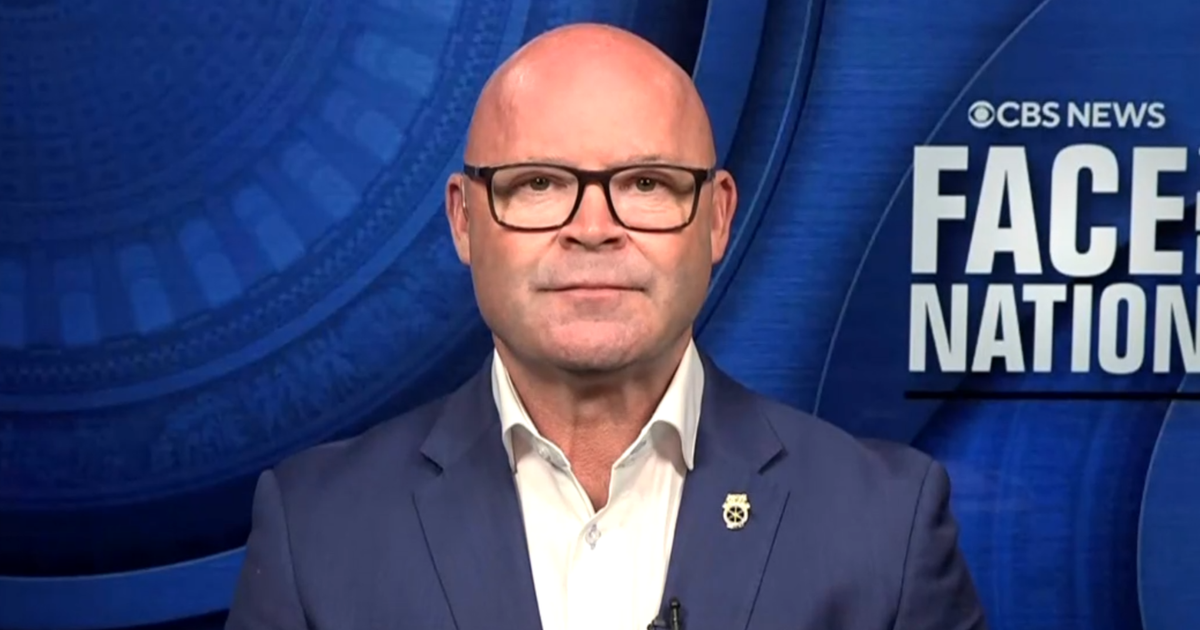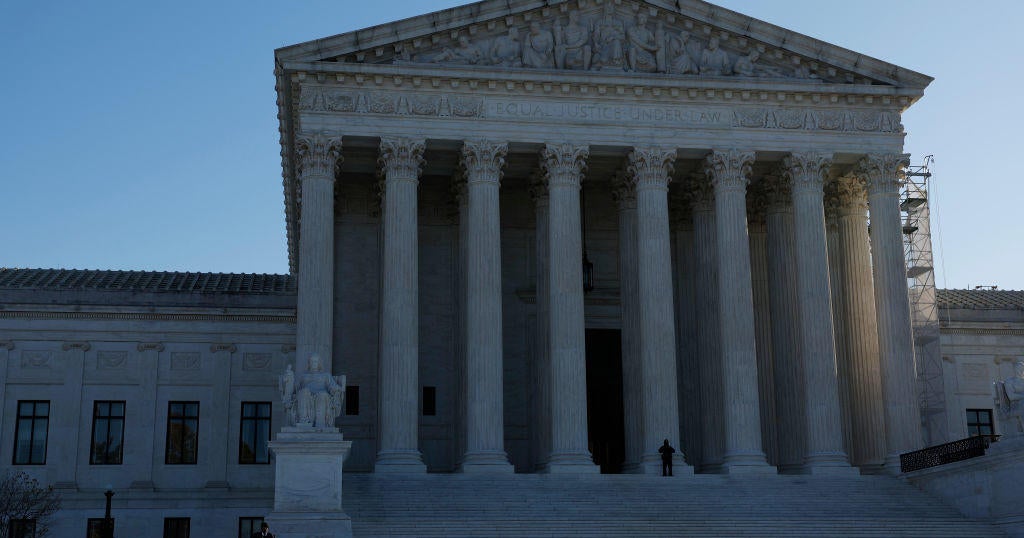CBS News
Transcript: Teamsters president Sean O’Brien on “Face the Nation with Margaret Brennan,” Sept. 1, 2024

The following is a transcript of an interview with Sean O’Brien, president of the International Brotherhood of Teamsters, on “Face the Nation with Margaret Brennan” that aired on Sept. 1, 2024.
NANCY CORDES: We turn now to Sean O’Brien. He is the president of the International Brotherhood of Teamsters, one of the nation’s largest labor unions, and he joins us this morning from Boston. President O’Brien, thank you so much for being with us on this Labor Day weekend. I want to start out by asking you about endorsements, you lead one of the 10 largest unions in this country, and I want to put this graphic up. Take a look. The other nine have all issued their endorsements for President of the United States. They’ve all endorsed Vice President Kamala Harris and her running mate, Tim Walz. It is now September 1. Where has summer gone? When do the teamsters plan to announce who they are endorsing?
SEAN O’BRIEN: Well, I think historically, the teamsters have always endorsed after both respective conventions. This is a little different. This time, under our leadership, we brought every single candidate to the table in front of our rank and file members and our general executive board, and we’re waiting on Vice President Harris to commit to come meet with us.
NANCY CORDES: And I believe her campaign- campaign says they are working with you to figure out a date for that. You know, her policies are more or less in line with the current President, who you did sit down with when you thought that he was going to be the nominee, when we all thought he was going to be the nominee. Are there any concerns that you have about Harris possibly being less pro labor, less pro union than the current President?
SEAN O’BRIEN: So our union is a lot different than most unions. We represent 1.3 million members. Half of our members are Republicans, half of our members are Democrats. So we have to serve all of our membership equally. Look, everybody has a different style of leadership. We want the opportunity to sit down with Vice President Harris. I mean, I said to someone the other day, you don’t hire someone unless you give them an interview. And you know, this is our opportunity to ask her about Teamster specific issues and also labor issues. So until we have that meeting, you know, obviously we will wait to make that determination.
NANCY CORDES: Very quickly, you didn’t endorse anyone back in 1996, is that- is there a possibility that could happen again?
SEAN O’BRIEN: Look, we want to make sure we make the best decision and endorse the best candidate for labor. You know, 1996 was a long time ago. It’s all going to be driven by our rank and file members and our leadership. We’re a very, very Democratic union.
NANCY CORDES: Got it. Sean O’Brien, stay with us. We’re going to have more questions for you after the break. We’ll be right back.
NANCY CORDES: Welcome back to Face the Nation. We continue our conversation now with Teamsters President Sean O’Brien. Mr. O’Brien, thanks so much for sticking with us. One of your fellow unions, the United Auto Workers, filed federal labor charges against the Republican nominee Donald Trump after he seemed to celebrate the notion of firing workers who go on strike. That happened in a conversation that he was having with Elon Musk. Are you with the UAW on this? Do you support the action they took?
SEAN O’BRIEN: Look, I support anybody that attacks labor, they should be held accountable, and any organization that’s going to hold them accountable. I can’t speak for the UAW. But if you recall when those remarks were made by former President Trump, I was the first union to call them out, call the administration out, and call, quite frankly, Elon Musk out. I’ve been fighting corporate billionaires in greed for the last two and a half years. And you know, UAW feels they have a right to file a NLRB charge, that’s their right. I’ve got a right to call out former President Trump or anybody else that attacks labor.
NANCY CORDES: Yeah, if I’m remembering correctly, you called it economic terrorism. How did it go over with your members?
SEAN O’BRIEN: Look, our members love the fact that they have a voice, that they have the ability to stand up and fight corporate America. It’s been a long time coming. Over the last two and a half years, the Teamsters union has had 226 strikes. We’ve grown more than we ever have. So there is a great appetite for the fight with our rank and file members, and our rank and file members enable us to fight for them day in and day out.
NANCY CORDES: That’s a perfect segue into my next question, which is about union membership in this country. It is Labor Day weekend, after all. So let’s take a look at the state of union labor in this country. About 10% of the US workforce are union members, down from about 20% in 1983. A majority of Americans say that’s bad. That decline is bad for working people. Is the decline irreversible in your view?
SEAN O’BRIEN: The decline is definitely irreversible. Now let’s look back, you know, to 1983 that’s when a bipartisan congressional bill was passed, trucking deregulation, and we lost 400,000 members. A lot of companies went bankrupt. So you know, although there’s a lot of politicians taking credit for the labor movement of the last couple of years, they’re the same politicians that caused this problem that we face today. But to answer your question, I think we are definitely on the upswing. We have proved how valuable the American worker is to this country, especially through one of the biggest crisis we faced was a pandemic, and that has obviously incentivized workers to form unions, and we’ve got to work collaboratively with both sides to make sure that people be able to organize without retribution or retaliation moving forward, and that’s up to politicians, whether an R or D or I.
NANCY CORDES: 5:37
You know, you shared that message at the Republican Convention, a move that some members of Teamsters leadership did- did not approve of. They were pretty vocal about that. It appears that it also cost you a speaking slot at the Democratic Convention. Did the Democrats ever tell you why they didn’t give you a chance to speak?
SEAN O’BRIEN: No, they didn’t. And look, I’m going to say this, whatever the critics out there, and they’re very few, in the leadership. Whenever I get an opportunity to highlight the American worker, especially the Teamster worker, I’m going to take any and all venue. We asked both conventions, respectively, at the same time, and the Republican National Convention immediately responded to us. Didn’t try and edit any of our messages, and I was hopeful that the Democrats would do the same, but they didn’t. I’m not upset about it, but I can tell you this, my rank and file members, who have been lifelong Democrats, are not happy about it.
NANCY CORDES: 6:32
I know there were some members of the union who spoke, but that’s not the same as having the leader of the organization speak. Very quickly, did you choose to speak at the Republican Convention, which is a pretty unusual move for a union leader, because you feel that Trump has been more pro labor than past Republican nominees?
SEAN O’BRIEN: No, not at all. I spoke there because it was the ability to highlight how important we are. It was the ability to call out the people, the corporate elitist who forget who built this country, the American workers. You know, people like to, you know, have their own opinions on why we were there, but I was there to talk about the American workers. It wasn’t an endorsement for any and all Republicans. It was strictly a message about how important and how valuable we are, and to let the people know that fight us every day, that we’re not going away.
NANCY CORDES: Understood. Sean O’Brien, president of the Teamsters, thanks so much, and we’ll be looking forward to hearing who your union eventually endorses. Thanks for being here, and we’ll be right back.
CBS News
Prominent pro-Putin ballet star Sergei Polunin says he’s leaving Russia

Moscow — Former Royal Ballet star Sergei Polunin, famous for his tattoos of Russian President Vladimir Putin, on Wednesday announced that he plans to leave Russia. The Ukrainian-Russian dancer was one of the most prominent stars who backed Russia’s unilateral 2014 annexation of Crimea and its military assault on Ukraine. He was rewarded with prestigious state posts.
In a rambling, misspelled message on his Instagram account, Polunin wrote: “My time in Russia ran out a long time ago, it seems at this moment that I have fulfilled my mission here.”
The post first appeared Sunday on his little-read Telegram account.
Ian Gavan/Getty
Polunin, 35, did not give a specific reason for leaving but said that “a time comes when the soul feels it is not where it should be.”
He said he was leaving with his family — his wife Yelena and three children — but “where we will go is not clear so far.”
In the summer, the dancer complained of a lack of security and said he was being followed.
Polunin, who was born in Ukraine, backed Putin’s 2014 annexation of Crimea — a prelude to the ongoing, full-scale invasion of Ukraine that Putin launched in February 2022.
The dancer was granted Russian citizenship in 2019. He was appointed acting head of a dance academy in occupied Crimea’s biggest city, Sevastopol, and director of the city’s opera and ballet theatre, for which a large new building is under construction.
Just last year he was decorated by Putin for his role in popularizing dance. But in August he was replaced as head of the dance academy by former Bolshoi prima Maria Alexandrova, and a week ago, Russia’s arts minister Olga Lyubimova announced his theater director job would go to singer Ildar Abdrazakov.
This came after on December 9 Polunin published a social media post saying he was “very sorry for people” living in the heavily bombarded village near Ukraine’s city of Kherson, where his family originates from, and that “the worst deal would be better than war.”
Ian Gavan/Getty
Aged 13, Polunin won a scholarship to train at the Royal Ballet School in London and became its youngest ever principal dancer.
With his tattoos — including a large depiction of Putin’s face emblazoned prominently on his chest — and his rebellious attitude, he became known as the “bad boy of ballet” and caused a sensation by resigning from the Royal Ballet at the height of his fame in 2012.
Later he made a 2015 hit video to Irish musician Hozier’s song “Take Me to Church” and was the star of a 2016 documentary called “Dancer.”
He moved to perform at Moscow’s Stanislavsky Musical Theatre’s ballet before launching a solo career, starring in dance performances in roles including the mystic Grigory Rasputin.
In 2019 he posed for AFP with a large tattoo of Putin on his chest which he later supplemented with two Putin faces on either shoulder. He also has a large Ukrainian trident on his right hand.
This year he took part in Putin’s campaign for reelection as a celebrity backer.
CBS News
Supreme Court takes up South Carolina’s effort to defund Planned Parenthood

Washington — The Supreme Court on Wednesday agreed to consider South Carolina health department’s effort to cut off funding from Planned Parenthood because it performs abortions, wading into another dispute over access to the procedure in the wake of its reversal of Roe v. Wade.
The case, known as Kerr v. Edwards, stems from the state’s decision in 2018 to end Planned Parenthood South Atlantic’s participation in its Medicaid program. Gov. Henry McMaster, a Republican, directed the South Carolina Department of Health and Human Services to deem abortion clinics unqualified to provide family planning services and end their Medicaid agreements.
Planned Parenthood operates two facilities in the state, one in Charleston and the other in Columbia, and provides hundreds of Medicaid patients with services like physicals, cancer and other health screenings, pregnancy testing and contraception. Federal law prohibits Medicaid from paying for abortions except in cases of rape or incest, or to save the life of the mother.
Planned Parenthood and one of its patients, Julie Edwards, sued the state, arguing that cutting off its funding violated a provision of the Medicaid Act that gives beneficiaries the right to choose their provider.
A federal district court blocked South Carolina from ending Planned Parenthood’s participation in its Medicaid program, and a U.S. appeals court upheld that decision, finding that Edwards could sue the state to enforce the Medicaid Act’s free-choice-of-provider requirement.
The legal battle has already been before the Supreme Court in the past, with the high court last year ordering additional proceedings after deciding in a separate case that nursing home residents could sue their state-owned health care facility over alleged violations of civil rights.
After reconsidering its earlier decision, the three-judge appeals court panel ruled unanimously in March that Edwards’ lawsuit against the state could go forward and said South Carolina couldn’t strip Planned Parenthood of state Medicaid funds.
“This case is, and always has been, about whether Congress conferred an individually enforceable right for Medicaid beneficiaries to freely choose their healthcare provider. Preserving access to Planned Parenthood and other providers means preserving an affordable choice and quality care for an untold number of mothers and infants in South Carolina,” Judge Harvie Wilkinson wrote for the 4th Circuit panel.
South Carolina officials asked the Supreme Court to review that decision, marking the third time the case has been before the justices. The justices agreed to take up the question of whether “the Medicaid Act’s any-qualified provider provision unambiguously confers a private right upon a Medicaid beneficiary to choose a specific provider.”
South Carolina is among the more than two dozen that have passed laws restricting access to abortion in the wake of the Supreme Court’s June 2022 decision reversing Roe v. Wade. In South Carolina, abortion is outlawed after six weeks of pregnancy with some exceptions.
Several states have also enacted laws blocking Planned Parenthood from receiving Medicaid funding, including Arkansas, Missouri, Mississippi and Texas.
CBS News
Lithium battery fires on U.S. flights now occur nearly twice a week, according to new FAA data

As millions prepare to fly for the holidays, the Federal Aviation Administration is warning travelers about a hidden danger in their luggage: lithium-ion batteries. Found in everyday devices like laptops, tablets and even electric toothbrushes, these batteries can catch fire if they overheat or are damaged.
Last July, panic erupted on an American Airlines flight from San Francisco to Miami after a laptop battery in a carry-on bag ignited.
“It was absolute chaos. It truly felt like every man for themselves. And it was terrifying,” said Shilpa Patel, a passenger on the flight. “I don’t know if we’re going to explode. All I know is I need to get out and I need to survive.”
FAA data shows that lithium battery fires on U.S. flights have risen 388% since 2015, now occurring nearly twice a week.
“Any fire at 30,000 feet is unacceptable,” said David Wroth of UL Standards & Engagement, a safety research organization.
A survey of more than 800 flight attendants conducted by UL found that 87% are concerned about lithium battery risks on airplanes, and more than a third believe airlines should do more to ensure passenger safety. While the FAA requires airlines to include general safety information in preflight announcements, those warnings often don’t address the specific risk of battery fires.
“It’s a balance we probably need to do a better job striking with the airlines,” said Ben Supko, who oversees hazardous materials safety for the FAA. “Passengers don’t fully understand how serious the risk is.”
Supko said passengers need to monitor devices during a flight and immediately notifying the crew if a device becomes warm, discolors, or bulges. Passengers are also warned not to pack lithium batteries in checked luggage, as fires in the cargo hold are harder to extinguish.
“When you don’t know what’s going to happen, you act erratically,” said Patel. “It costs us nothing just to say, ‘Hey, the reason why we’re so serious about this is because it could be really dangerous. It could catch fire.'”
The UL survey also found that one in four passengers admits to packing lithium batteries in their checked bags. It is a dangerous practice for one reason in particular: It would be even harder to put out a fire in the plane’s cargo hold.
CBS News reached out to American Airlines regarding the incident at the San Francisco airport and potential updates to its safety announcements. The airline did not address the question directly but stated that its flight attendants receive thorough and ongoing training to handle emergencies onboard.




